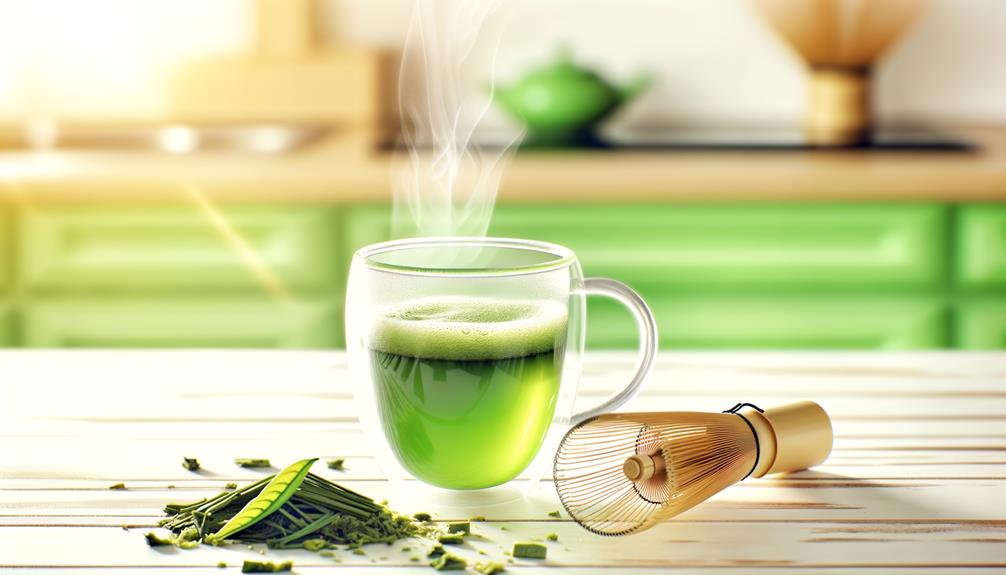Health Benefits of Matcha Green Tea
Step into the world of wellness with the wonders of matcha green tea. Packed with a powerful punch of health benefits, this vibrant beverage is more than just your average cup of tea.
But what exactly makes matcha so special? Well, get ready to uncover the secrets of its antioxidant properties, its potential to support cardiovascular health, and even its ability to regulate cholesterol levels.
But that’s not all – there’s still so much more to explore. So, grab a cup of matcha and let’s dive into the world of its health benefits together.
Key Takeaways
- Matcha green tea is a powerful antioxidant powerhouse, protecting cells and promoting overall health.
- Regular consumption of matcha can reduce the risk of cancer and inhibit tumor formation.
- Matcha improves cardiovascular health by preventing plaque build-up, lowering blood pressure, and reducing cholesterol levels.
- Matcha aids in weight management by boosting metabolism, increasing fat oxidation, and suppressing appetite.
Antioxidant Powerhouse
Matcha green tea is an antioxidant powerhouse, packed with potent catechins that help protect your cells and promote overall health. The abundance of catechins in matcha makes it a natural antioxidant powerhouse. These antioxidants play a crucial role in preventing cell damage caused by harmful molecules called free radicals. By neutralizing these free radicals, matcha can help reduce the risk of chronic diseases such as heart disease, cancer, and neurodegenerative disorders.
The green tea catechins found in matcha have been shown to have greater antioxidant activity than those found in regular loose-leaf green tea. This means that drinking matcha can significantly increase your antioxidant intake compared to other types of green tea. Antioxidants are essential for maintaining optimal health as they help protect your cells from oxidative stress, which can lead to cell damage and contribute to the development of diseases.
Studies have also shown that the catechins in matcha may have anti-cancer properties. They’ve the potential to inhibit the growth of cancer cells and reduce the risk of tumor formation. Regular consumption of matcha can therefore be beneficial for those looking to reduce their risk of cancer.
Cardiovascular Support
To further explore the health benefits of matcha green tea, let’s now shift our focus to its potential role in supporting cardiovascular health.
- Matcha may improve cardiovascular health by preventing plaque build-up and thickening of heart tissue. The antioxidants in matcha can help protect the heart and blood vessels from oxidative damage.
- It has been associated with a lower risk of cardiovascular disease. Consuming matcha as part of a balanced diet and lifestyle may promote heart health.
- Matcha may support healthy blood pressure levels, contributing to overall cardiovascular well-being.
- Matcha has been found to lower LDL cholesterol and total cholesterol levels, which are risk factors for cardiovascular disease.
- Matcha can be easily incorporated into various recipes, making it a convenient way to enjoy its cardiovascular benefits.
Cholesterol Regulation
Consuming matcha tea regularly may contribute to maintaining healthy cholesterol levels, potentially reducing the risk of heart disease and stroke. Matcha green tea contains antioxidants that have been shown to lower LDL (bad) cholesterol and increase HDL (good) cholesterol.
Several studies have examined the effects of matcha tea on cholesterol levels, and the results are promising. One study found that participants who consumed matcha powder experienced a significant reduction in total cholesterol levels compared to a control group. Another study showed that matcha tea had a positive impact on LDL cholesterol, preventing its oxidation, which is a crucial factor in the development of heart disease.
The catechins found in matcha tea are responsible for its cholesterol-regulating properties. These antioxidants work to inhibit the absorption of cholesterol in the intestines, promoting its excretion from the body. By incorporating matcha tea into your diet, you can support your cardiovascular health and maintain a healthy cholesterol profile.
To reap the benefits, it’s recommended to drink matcha tea regularly as part of a balanced diet. You can enjoy matcha tea on its own or incorporate it into various recipes, such as smoothies or oatmeal. By making matcha tea a part of your routine, you can take a proactive step towards maintaining healthy cholesterol levels and promoting overall heart health.
Potential Cancer Prevention
Research suggests that incorporating matcha into your diet may have potential cancer prevention benefits. Matcha contains compounds, such as catechins, that have been found to have anti-cancer properties. These compounds have been shown to inhibit the growth of cancer cells and protect against DNA damage. While further research is needed to understand the specific effects of matcha on preventing cancer in humans, preliminary studies have shown promising results.
Here are some potential cancer prevention benefits of matcha:
- Matcha contains catechins, especially epigallocatechin gallate (EGCG), which may help protect against DNA damage and slow tumor growth.
- Matcha has been associated with a lower risk of stomach cancer, possibly due to its anti-inflammatory and antioxidant properties.
- The antioxidants in matcha help reduce inflammation, which is linked to the development of chronic health conditions, including cancer.
- Matcha may also support a healthy immune system, which is important for fighting off cancer cells.
- Matcha’s high antioxidant content may help prevent oxidative stress, a key factor in the development of cancer.
While matcha shows promise in preventing cancer, it’s important to note that it shouldn’t be considered a standalone treatment. It should be incorporated into a balanced diet along with other healthy lifestyle choices. As always, it’s recommended to consult with a healthcare professional for personalized advice.
Weight Management Aid
Matcha green tea can be a helpful tool in managing your weight due to its ability to boost metabolism and increase fat oxidation. Matcha contains catechins and high levels of caffeine, which have been associated with promoting weight management. Research suggests that matcha can enhance weight loss by increasing energy expenditure and fat burning.
One study found that matcha green tea powder increased thermogenesis, the process by which the body burns calories to produce heat. Another study showed that consuming matcha can increase fat oxidation during exercise. These findings suggest that matcha can help increase the number of calories burned and the amount of fat used as fuel.
In addition to its effects on metabolism and fat oxidation, matcha may also help suppress appetite. A study in overweight women found that consuming matcha before a meal led to decreased hunger and increased feelings of fullness compared to a placebo.
It’s important to note that while matcha can be a helpful tool in weight management, it isn’t a magic solution. It should be used in conjunction with a balanced diet and regular physical activity. Adding matcha to your routine may provide an extra boost to support your weight management goals.
Skin Health Boost
To boost the health of your skin, consider incorporating matcha into your daily routine. Matcha’s high antioxidant content may help protect the skin from damage caused by free radicals and environmental stressors. The catechins in matcha can promote skin regeneration and reduce inflammation, contributing to a healthy complexion. Drinking matcha may help improve overall skin health by reducing the signs of aging and promoting a radiant, glowing appearance. The polyphenols in matcha have been associated with potential protective effects against UV radiation, supporting skin resilience and health. Consuming matcha as part of a balanced diet may contribute to maintaining clear, healthy skin due to its anti-inflammatory and antioxidant properties.
Incorporating matcha into your daily routine offers several benefits for your skin health:
- Matcha’s high antioxidant content helps prevent cell damage and protects the skin from free radicals and environmental stressors.
- The catechins found in matcha promote skin regeneration and reduce inflammation, resulting in a healthier complexion.
- Drinking matcha can improve overall skin health, reducing signs of aging and giving your skin a radiant, glowing appearance.
- The polyphenols in matcha have potential protective effects against UV radiation, supporting skin resilience and health.
- Including matcha in your diet helps maintain clear and healthy skin by harnessing its anti-inflammatory and antioxidant properties.
Blood Pressure Maintenance



Maintaining healthy blood pressure levels is crucial for overall cardiovascular health. Incorporating matcha tea into your daily routine may have a positive impact on blood pressure maintenance. Matcha tea consumption has been linked to helping maintain healthy blood pressure levels due to its high concentration of antioxidants. The antioxidants in matcha, such as catechins, can help prevent cell damage and lower the risk of developing high blood pressure. Regular consumption of matcha may also assist in promoting healthy circulation, which can have a positive effect on blood pressure. The combination of catechins and caffeine found in matcha may contribute to the maintenance of optimal blood pressure levels. Additionally, matcha’s potential to reduce oxidative stress and inflammation can support overall cardiovascular health and blood pressure regulation. By incorporating matcha tea into your daily routine, you can enjoy its numerous health benefits and help maintain healthy blood pressure levels.
Oral Health Benefits
Incorporating matcha tea into your daily routine not only helps maintain healthy blood pressure levels but also provides a range of oral health benefits. Here are some of the ways matcha green tea can contribute to better oral health:
- Matcha green tea can reduce bacterial growth in the mouth, promoting better oral health. The catechins present in matcha have been found to inhibit the growth of harmful bacteria that can cause cavities and gum disease.
- The catechins in matcha may help prevent tooth decay and improve overall mouth hygiene. These compounds have been shown to inhibit the activity of bacteria that contribute to the formation of dental plaque and cavities.
- Consuming matcha can lead to fresher breath and a reduction in oral inflammation. The antibacterial properties of matcha help to combat the odor-causing bacteria in the mouth, while its anti-inflammatory properties can help reduce gum inflammation.
- Matcha’s antioxidants can support gum health and contribute to a healthier oral microbiome. The antioxidants in matcha help to reduce inflammation and oxidative stress in the gums, promoting gum health and preventing gum disease.
- Incorporating matcha into your routine may help protect against certain oral infections and diseases. The antimicrobial properties of matcha can help prevent the growth of harmful bacteria in the mouth, reducing the risk of oral infections.
Additionally, matcha’s beneficial effects on oral health can contribute to overall oral health and well-being.
Enhanced Focus and Alertness



Enhance your focus and alertness with the unique combination of caffeine and L-theanine found in matcha green tea. Matcha green tea is known for its ability to promote cognitive performance and improve attention and reaction time. The combination of caffeine and L-theanine in matcha works synergistically to provide these benefits.
Caffeine is a natural stimulant that can provide a boost of energy and help increase alertness. It stimulates the central nervous system and enhances cognitive function. However, consuming caffeine alone can sometimes lead to jitters or crashes. This is where L-theanine comes in.
L-theanine is an amino acid that promotes relaxation and helps counteract the negative effects of caffeine. It promotes a state of calm alertness, allowing you to stay focused and attentive without feeling anxious or jittery.
Regular consumption of matcha green tea has been linked to improved mental clarity and concentration. It can help you achieve a sustained and balanced state of focus and alertness throughout the day.
Incorporating matcha green tea into your daily routine can be a simple and effective way to enhance your focus and alertness. Whether you choose to enjoy it as a traditional tea, as part of a latte, or in other culinary applications, matcha green tea can provide the health benefits you’re looking for.
Frequently Asked Questions
What Does Green Tea, Matcha Do to Your Body?
Green tea, matcha, does a lot for your body! It’s packed with antioxidants that protect your cells and could have more than regular green tea. Matcha might lower blood pressure and bad cholesterol levels.
It can also be used in cooking, like tea, lattes, or smoothies. Some studies suggest it could fight cancer, help with weight loss, and improve skin health.
What Happens if I Drink Matcha Tea Everyday?
If you drink matcha tea every day, get ready for a sustained energy boost that won’t leave you jittery.
This green tea powerhouse is packed with antioxidants that may help protect your body against diseases.
Not only that, matcha can support weight management by revving up your metabolism and burning fat.
It’s also been linked to potential heart health benefits, like lowering blood pressure.
Plus, daily matcha consumption may even sharpen your brain function, improving attention, reaction time, and memory!
Does Matcha Green Tea Burn Belly Fat?
Yes, matcha green tea has the potential to burn belly fat. It contains antioxidants and catechins that have been associated with weight loss and fat reduction.
The combination of catechins and caffeine in matcha may contribute to its ability to burn belly fat. However, more research is needed to fully understand the specific effects of matcha green tea on burning belly fat.
Who Should Not Drink Matcha Green Tea?
If you’re wondering who shouldn’t drink matcha green tea, there are a few considerations.
First, if you’re sensitive to caffeine, be cautious as matcha has higher caffeine content.
Individuals with liver conditions should consult a healthcare professional due to potential impacts on liver health.
Pregnant or breastfeeding individuals should seek medical advice to ensure it’s safe for them and their baby.
If you have allergies to green tea or related plants, it’s best to avoid matcha.
Lastly, if you’re taking certain medications, especially those affected by caffeine, consult a doctor to prevent potential interactions.
Conclusion
In conclusion, matcha green tea is a natural and delicious way to boost your health. With its high antioxidant content, it can help protect your body against oxidative damage. Additionally, matcha has been shown to support cardiovascular health, regulate cholesterol levels, and potentially prevent cancer. It can also aid in weight management, improve skin health, and maintain blood pressure.
Furthermore, matcha offers oral health benefits and enhances focus and alertness. Did you know that matcha contains 137 times more antioxidants than regular green tea? Incorporating matcha into your daily routine can provide you with a wide range of health benefits.



